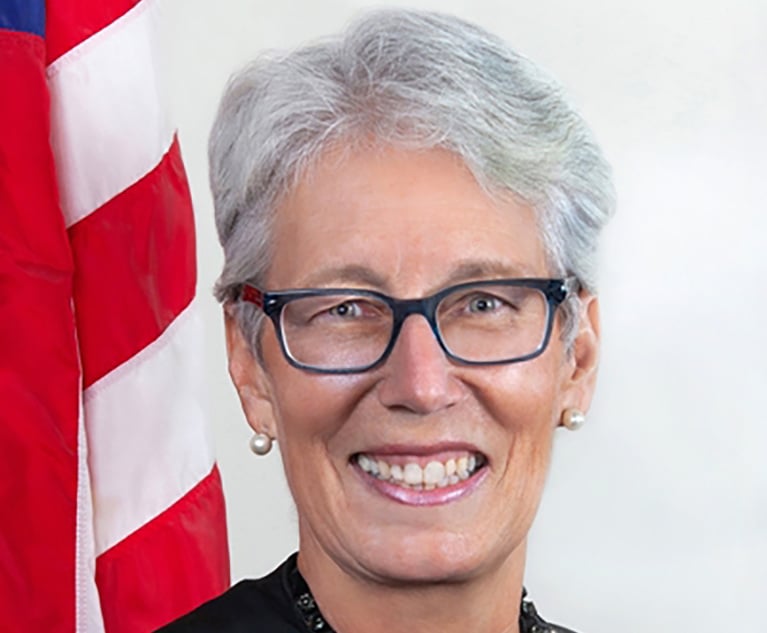 Photo: Gino Santa Maria/Shutterstock.com
Photo: Gino Santa Maria/Shutterstock.com Senate OKs Bill to Bind Del. Presidential Electors to Back National Popular-Vote Winner
The Senate's elections, government and community affairs committee voted to advance SB 22 for debate before the full chamber, where a majority of members have already signaled their support of the bipartisan measure.
March 06, 2019 at 05:42 PM
5 minute read
The original version of this story was published on Delaware Law Weekly
The Delaware Senate on Thursday voted to add Delaware to a growing coalition of states seeking to bypass Electoral College by pledging electoral votes to the winner of the national popular vote for president.
On a 14-7 vote, the upper house gave its approval to SB 22, which now moves on for consideration in the state House of Representatives. The yes vote did, however, come after a wave of defections from some Republicans who had previously signed on as co-sponsors.
The bill, introduced last month in the General Assembly, would contribute Delaware's three electoral votes to the agreement, known as the National Popular Vote Interstate Compact, and bring the First State in line with other states that have already passed the same measure.
The compact would only go into effect once enough states have signed on to clear the threshold of 270 electoral votes—enough to deliver an automatic victory to the popular vote winner.
So far, 11 states and the District of Columbia have passed similar bills to change their election laws, representing 172 electoral votes needed for the compact to succeed. Colorado, with its nine electoral votes, passed its own legislation last month, and Gov. Jared Polis has said he intends to sign it.
Supporters in Delaware said the measure was needed to restore fairness to national elections at a time when only a handful of battleground states can determine the outcome of a presidential election.
“One person, one vote is a hallmark of our democracy,” said state Sen. Bryan Townsend, D-Newark, the bill's prime sponsor in the Senate, said in a statement last month.
“This bill helps ensure that every vote—in every state—will matter,” he said.
Gov. John Carney, asked by reporters Tuesday, said he would sign the bill if it reached his desk, a spokesman said.
The legislation would not altogether abolish the Electoral College, the Constitutional mechanism for electing presidents and vice presidents based on the top vote-getter in each state. Rather, it would provide a workaround to a Constitutional amendment by requiring presidential electors to cast their votes for the candidate who received the most votes in all 50 states and the District of Columbia.
Though the bill was initially introduced with bipartisan support, Republican cosponsors this week removed their names from the bill, citing blowback from their constituents.
Rep. Jeff Spiegelman, R-Clayton, who said in a press release last month that the “compact fits the spirit of the original intent of our Founding Fathers, was the first to publicly rescind his endorsement, saying in a Facebook post Wednesday that he “did not anticipate the overwhelming opposition” to the bill among his constituents.
“I apologize for the angst that I may have caused by originally agreeing to sponsor the legislation,” he wrote.
“It was certainly never my intent to go against the will of the people I have been so proud to serve since 2012,” Spiegelman said.
On Thursday, Reps. Michael Ramone, R-Pike Creek, and Michael F. Smith, R-Pike Creek, removed their names, as well.
In the Senate, however, Republican cosponsors Sens. Catherine Cloutier, R-Arden, and Anthony Delcollo, R-Elsmere, joined the chamber's 12 Democrats in passing the measure. Delcollo said he believed the interstate compact was constitutional and would help reverse a troubling trend of federal resources being disproportionately assigned to swing states that currently have the power to sway the outcomes of presidential elections.
Though he had received calls from Republican voters mostly outside his district, Delcollo said his views on the measure hadn't changed.
“As far as I'm concerned, my motivations are far from partisan,” he said.
Started in 2006, the compact aims to eliminate so-called “wrong-winner elections,” in which a candidate wins the presidency despite losing the popular vote.
Former President George W. Bush garnered about 540,000 fewer votes than Democratic challenger Al Gore on his way to winning the 2000 presidential election, which was eventually decided in the U.S. Supreme Court. And President Donald Trump in 2016 skated to victory with 304 electoral votes, despite receiving nearly three million fewer popular votes than Hillary Clinton.
In total, four presidents in American history have won the White House and lost the popular vote.
As it stands, the National Popular Vote Interstate Compact is currently 98 electoral votes short of going into effect, and will likely need buy-in from solidly red or swing states. However, if it were to go into effect, it would likely face legal challenges that could delay its implementation.
This content has been archived. It is available through our partners, LexisNexis® and Bloomberg Law.
To view this content, please continue to their sites.
Not a Lexis Subscriber?
Subscribe Now
Not a Bloomberg Law Subscriber?
Subscribe Now
NOT FOR REPRINT
© 2024 ALM Global, LLC, All Rights Reserved. Request academic re-use from www.copyright.com. All other uses, submit a request to [email protected]. For more information visit Asset & Logo Licensing.
You Might Like
View All
Attorneys, Professors Share Support for Chancellor Following Musk's Online Attacks
4 minute read

Jurden Announces 2025 Retirement, Capping 24 Years on Superior Court
3 minute read
Trending Stories
- 1Pardoning Jan. 6 Defendants May Send Bad Message About Insurrection, Rule of Law
- 2Looming Clash Over Abortion Pills Shows Overturning 'Roe v. Wade' Settled Nothing
- 33rd Circuit Strikes Down NLRB’s Monetary Remedies for Fired Starbucks Workers
- 4Latest Class of Court Officers Sworn into Service in New York
- 5Kirkland's Daniel Lavon-Krein: Staying Ahead of Private Equity Consolidation
Who Got The Work
Michael G. Bongiorno, Andrew Scott Dulberg and Elizabeth E. Driscoll from Wilmer Cutler Pickering Hale and Dorr have stepped in to represent Symbotic Inc., an A.I.-enabled technology platform that focuses on increasing supply chain efficiency, and other defendants in a pending shareholder derivative lawsuit. The case, filed Oct. 2 in Massachusetts District Court by the Brown Law Firm on behalf of Stephen Austen, accuses certain officers and directors of misleading investors in regard to Symbotic's potential for margin growth by failing to disclose that the company was not equipped to timely deploy its systems or manage expenses through project delays. The case, assigned to U.S. District Judge Nathaniel M. Gorton, is 1:24-cv-12522, Austen v. Cohen et al.
Who Got The Work
Edmund Polubinski and Marie Killmond of Davis Polk & Wardwell have entered appearances for data platform software development company MongoDB and other defendants in a pending shareholder derivative lawsuit. The action, filed Oct. 7 in New York Southern District Court by the Brown Law Firm, accuses the company's directors and/or officers of falsely expressing confidence in the company’s restructuring of its sales incentive plan and downplaying the severity of decreases in its upfront commitments. The case is 1:24-cv-07594, Roy v. Ittycheria et al.
Who Got The Work
Amy O. Bruchs and Kurt F. Ellison of Michael Best & Friedrich have entered appearances for Epic Systems Corp. in a pending employment discrimination lawsuit. The suit was filed Sept. 7 in Wisconsin Western District Court by Levine Eisberner LLC and Siri & Glimstad on behalf of a project manager who claims that he was wrongfully terminated after applying for a religious exemption to the defendant's COVID-19 vaccine mandate. The case, assigned to U.S. Magistrate Judge Anita Marie Boor, is 3:24-cv-00630, Secker, Nathan v. Epic Systems Corporation.
Who Got The Work
David X. Sullivan, Thomas J. Finn and Gregory A. Hall from McCarter & English have entered appearances for Sunrun Installation Services in a pending civil rights lawsuit. The complaint was filed Sept. 4 in Connecticut District Court by attorney Robert M. Berke on behalf of former employee George Edward Steins, who was arrested and charged with employing an unregistered home improvement salesperson. The complaint alleges that had Sunrun informed the Connecticut Department of Consumer Protection that the plaintiff's employment had ended in 2017 and that he no longer held Sunrun's home improvement contractor license, he would not have been hit with charges, which were dismissed in May 2024. The case, assigned to U.S. District Judge Jeffrey A. Meyer, is 3:24-cv-01423, Steins v. Sunrun, Inc. et al.
Who Got The Work
Greenberg Traurig shareholder Joshua L. Raskin has entered an appearance for boohoo.com UK Ltd. in a pending patent infringement lawsuit. The suit, filed Sept. 3 in Texas Eastern District Court by Rozier Hardt McDonough on behalf of Alto Dynamics, asserts five patents related to an online shopping platform. The case, assigned to U.S. District Judge Rodney Gilstrap, is 2:24-cv-00719, Alto Dynamics, LLC v. boohoo.com UK Limited.
Featured Firms
Law Offices of Gary Martin Hays & Associates, P.C.
(470) 294-1674
Law Offices of Mark E. Salomone
(857) 444-6468
Smith & Hassler
(713) 739-1250






